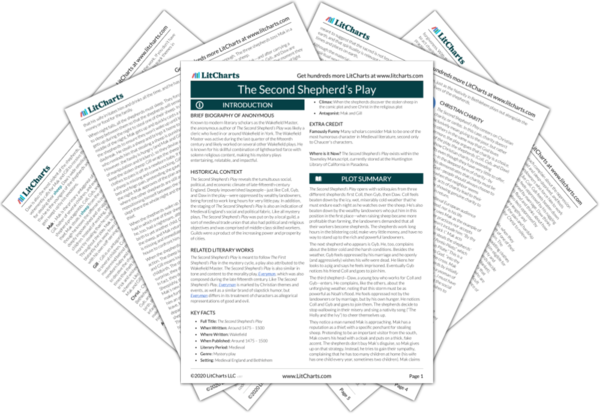Earthly vs. Spiritual
The Second Shepherd’s Play shows that worldly situations—no matter how banal or absurd—are always imbued with the sacred. The play’s very structure embodies this idea. The first part of the play—the plotline in which Mak steals a sheep from the shepherds (Coll, Gyb, and Daw)—seems wholly devoid of spirituality, focusing instead on problems that belong solely to the earthly realm. The second part of the play, however, which is the story…
read analysis of Earthly vs. SpiritualChristian Charity
The Second Shepherd’s Play centers on Christian charity, or caritas. In this case, charity doesn’t exclusively mean giving to the poor, but rather showing love to others in the same way that God loves mankind. Furthermore, the play argues that charity is a choice. Over the course of the play, the shepherds (Coll, Gyb, and Daw) gradually learn to show Christian charity by extending friendship, giving gifts even though they…
read analysis of Christian CharitySuffering and Redemption
Throughout most of The Second Shepherd’s Play, the three shepherd protagonists—Coll, Gyb, and Daw—are repeatedly beaten down by bad weather, exhaustion, hunger, and other people. Even though this oppression seems crippling and constant, the play suggests that Christ’s redemption and forgiveness have the power to relieve earthly suffering. The shepherds prove themselves to be worthy of this redemption by forgiving Mak for his thievery and manipulation. In this way…
read analysis of Suffering and Redemption
Song as a Means for Transformation
The Second Shepherd’s Play is a “mystery play,” which is a Medieval play meant to simultaneously entertain the audience and teach them biblical lessons. Echoing the mystery play’s twofold purpose, the songs in The Second Shepherd’s Play are meant to be both engaging and didactic. They pull the audience in with their beauty or humor, while simultaneously providing serious religious teaching on the importance of the nativity. Throughout the play, songs appear in moments associated…
read analysis of Song as a Means for Transformation






